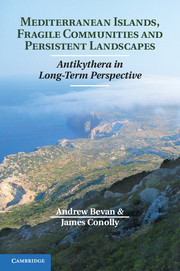 Mediterranean Islands, Fragile Communities and Persistent Landscapes
Mediterranean Islands, Fragile Communities and Persistent Landscapes Book contents
- Frontmatter
- Dedication
- Contents
- Figures and Colour Plates
- Tables
- Acknowledgements
- Abbreviations
- 1 Problems and Perspectives
- 2 Methods and Data
- 3 A Mediterranean and Island Environment
- 4 Material Worlds
- 5 Landscape Archaeology and Historical Ecology I
- 6 Landscape Archaeology and Historical Ecology II
- 7 Mobility and Investment
- 8 The Eccentric, the Specialist and the Displaced
- 9 Antikythera in Context
- Appendix I Statistical and Computational Methods
- Appendix II Locations by Period
- Miscellaneous Endmatter
- Notes
- Bibliography
- Index
3 - A Mediterranean and Island Environment
Published online by Cambridge University Press: 05 July 2013
- Frontmatter
- Dedication
- Contents
- Figures and Colour Plates
- Tables
- Acknowledgements
- Abbreviations
- 1 Problems and Perspectives
- 2 Methods and Data
- 3 A Mediterranean and Island Environment
- 4 Material Worlds
- 5 Landscape Archaeology and Historical Ecology I
- 6 Landscape Archaeology and Historical Ecology II
- 7 Mobility and Investment
- 8 The Eccentric, the Specialist and the Displaced
- 9 Antikythera in Context
- Appendix I Statistical and Computational Methods
- Appendix II Locations by Period
- Miscellaneous Endmatter
- Notes
- Bibliography
- Index
Summary
Mediterranean environments and ecologies hold an unusual fascination. As many commentators have pointed out, they are by turns both fragmented and connective, fragile and resilient, surprisingly consistent and yet strangely idiosyncratic (e.g., Braudel 1972, pp. 25—275; Horden and Purcell 2000; Blondel et al. 2010). The physical configuration of the Mediterranean structures the flow of people, plants, animals, objects and ideas in specific directions, with important effects over both the short and long term. Antikythera sits at one of those geographically nodal points where the resulting contrasts and contingencies are particularly powerful. It lies along a set of narrower north-south links between Libya, Crete, Kythera and the Peloponnese, and east-west between the hyper-insular Aegean and the quite different maritime expanses and terrestrial fringes of the Adriatic and Ionian seas. The Mediterranean region's soils, climate, plants and animals have become strongly linked to the success of human populations, and Antikythera experiences both glut and scarcity in terms of such resources. It is a small island, a deceptively bounded entity that encourages various forms of conceptual isolation (for inhabitants, visitors and those who study it alike), but typically also demands forms of subsistence and engagement that extend far beyond its coastline. As we argued in the introduction, its size provides some unusual analytical opportunities as long as we remain careful about how we contextualise it within a wider world.
Information
- Type
- Chapter
- Information
- Mediterranean Islands, Fragile Communities and Persistent LandscapesAntikythera in Long-Term Perspective, pp. 23 - 45Publisher: Cambridge University PressPrint publication year: 2013